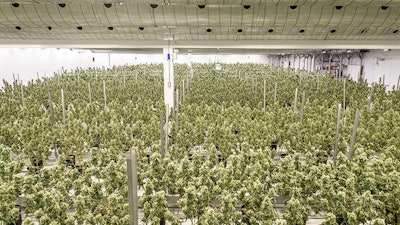
Canopy Growth has unveiled what it calls a “production optimization plan” for its operations in Canada, which includes the closure of two greenhouse facilities and the elimination of roughly 500 employees.
“Although difficult, [the] decision was made in order to align Canopy Growth’s supply with consumer demand and improve production efficiencies over time,” CEO David Klein told Cannabis Business Times in an emailed statement.
Canopy plans to shutter its greenhouses in Aldergrove and Delta, British Columbia, which make up roughly 3 million square feet of licensed production space, and the company no longer plans to open a third greenhouse in Niagara-on-the-Lake, Ontario, according to a March 4 press release.
“Nearly 17 months after the creation of the legal adult-use market, the Canadian recreational market has developed slower than anticipated, creating working capital and profitability challenges across the industry,” Klein said. “Additionally, federal regulations permitting outdoor cultivation were introduced after the company made significant investments in greenhouse production. The company now operates an outdoor production site to allow for more cost-effective cultivation, which will play an increasingly important role in meeting demand on certain products that rely on cannabis extracts. Following a strategic review of production capacity and forecasted demand, the company announced … that these facilities are no longer essential to its cultivation footprint.”
The capital markets have “bombarded” the industry in Canada, said Deepak Anand, director of Canadians for Fair Access to Medical Marijuana and vice president of NORML Canada.
It took a while for investors to realize that they should ask the same detailed questions as they do in other industries about what they should do with their money before proceeding with capital raises, said Anand, who is also co-founder and CEO of Materia Ventures and serves on the board of Valens GroWorks. Now they’re closely watching the industry.
“From an investor perspective, you can expect a significant microscopic lens to be put on everything that you plan to do, and it certainly put the industry, in many ways, behind from that perspective because well-intentioned folks that might have a significant business model that could do very well, are going to also be hamstrung by challenges on the capital raise side,” Anand said.
At the same time, oversupply in Canada for both medical and recreational markets has hurt cultivators like Canopy Growth, he said.
“I think with Health Canada adding more and more licensed producers, it's not making that task any easier,” Anand said. “I think we're still seeing a number of licensing being granted. Just last week, Health Canada issued nine or 10 licenses on one day itself. And this is for pretty sizable facilities.”
At the same time, he said, Cannabis 2.0 presents opportunities for businesses in the market, yet there haven’t been any major cannabis beverage launches. And with beverage producer and marketer Constellation Brands owning a roughly 37% stake in Canopy, Anand said, "The fact that Canopy hasn't managed to launch a beverage to date is actually quite shocking."
Although challenges abound in Canada’s cannabis market, Farrell A. Miller, secretary of NORML Canada and chief compliance officer for ERBN Green Cannabis Co.—which hasn’t yet opened three planned dispensaries in Ontario—told Cannabis Business Times that Canopy’s growth expectations didn’t match what it could sell at retail.
“They've scaled up at a pace that they haven't been able to keep up with when it comes to the retail side and it comes to their products,” she said. “I do think that there's been some bad decision-making on the executive level across the board, and it's resulted in … a number of job losses across the country.”
Among those laid off were foreign workers from Guatemala who came to Canada as part of the federal Temporary Foreign Worker Program, as well as immigrants from India, according to The Province. Some of those Guatemalan workers are headed home.
However, Canopy Growth is only one of many large Canadian cannabis companies making decisions that lack the right focus, Miller said, in response to a question asking if she would attribute Aurora Cannabis’ recent layoffs to the same factors as Canopy’s.
“It's sort of an across-the-board symptom of what's kind of happening with some of these larger entities,” she said. “It appears they focused a lot on scaling up, perhaps when they should have focused on developing the best products with the incredible workforce they amassed.”
When asked if the Canadian federal government or provincial governments share responsibility with Canopy Growth for the layoffs and greenhouse closures, Miller said looser regulations would help workers in the industry who experience job losses. In addition, she said, the government should do more to make sure “frontline workers” have the same flexibility to move between jobs in the industry as executives.
Once ERBN Green Cannabis Co. opens its two planned storefronts in Toronto and one planned storefront in Ontario’s Prince Edward County, Miller said it may purchase product from Canopy Growth.
“At this time, it's a bit of a wait and see for us because we want to see what's available, first of all, and we want to see what the people are going to be buying,” she said. “We want to stock the products that are selling to the consumers. So, we're going to keep a close eye on that."
Alex Krause, NORML Canada treasurer, noted in a joint call with Miller that beverage company investor Constellation Brands announced it would not contribute any more cash to Canopy. In the same regulatory filing where it shared the cease in funding, Constellation shared a nine-month net loss of US$125.4 million from Canopy, BNN Bloomberg reported.
“This was a long time in the making,” Krause said. “For a very long time, Canopy struggled to actually turn revenue around. But they're not alone. A lot of companies are facing those same problems because they're overinvesting and acquiring companies that are way too valuable than what they're actually producing.”
On March 4, brokerage and investment banking firm Stifel issued a note to investors about changes at Canopy Growth titled “Here's to Current (and Thoughtful!) Optimization.”
“This is the first significant announcement by the company in its process to optimize its investment,” the note read. “Canopy is embracing a deliberate process that considers both the current and evolving market.
Although he offered no direct comment on Canopy Growth’s situation, John Carle, executive director of the Alberta Cannabis Council, told Cannabis Business Times that adult-use cultivators working with the province face sales challenges in part because the Alberta Gaming, Liquor and Cannabis (AGLC) agency owns all product before it hits retail. In other words, the agency takes authority over the product from the cultivator.
“If there's a strain of product that they're retailing that nobody wants, there's nothing [the LPs] can do to reduce the price or to incentivize it for the retailer or accept a return,” he said.
Canopy’s website promotes the Tweed 53 brand in Alberta. The company didn’t comment on how many, if any, employees to be laid off are working in Alberta or have ties to business there.
In the press release issued March 4, Klein said Canopy’s recent decisions were not taken lightly.
“Along with the rest of the management team, I want to sincerely thank the members of the team affected by this decision for their work and commitment to building Canopy Growth,” Klein said.

























